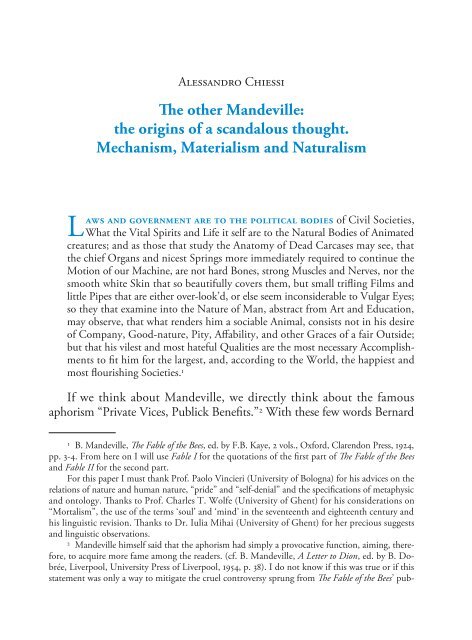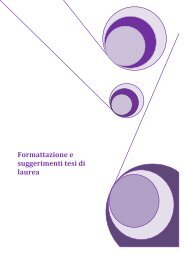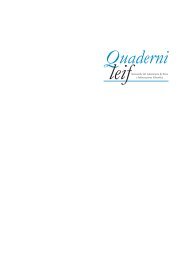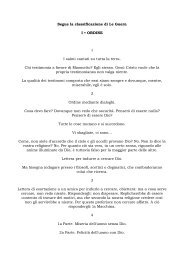qui - maria vita romeo
qui - maria vita romeo
qui - maria vita romeo
Create successful ePaper yourself
Turn your PDF publications into a flip-book with our unique Google optimized e-Paper software.
Alessandro Chiessi<br />
e other Mandeville:<br />
the origins of a scandalous thought.<br />
Mechanism, Materialism and Naturalism<br />
LaWS aND goVerNMeNT are To THe PoLITIcaL boDIeS of Civil Societies,<br />
What the Vital Spirits and Life it self are to the Natural Bodies of Animated<br />
creatures; and as those that study the Anatomy of Dead Carcases may see, that<br />
the chief Organs and nicest Springs more immediately re<strong>qui</strong>red to continue the<br />
Motion of our Machine, are not hard Bones, strong Muscles and Nerves, nor the<br />
smooth white Skin that so beautifully covers them, but small trifling Films and<br />
little Pipes that are either over-look’d, or else seem inconsiderable to Vulgar Eyes;<br />
so they that examine into the Nature of Man, abstract from Art and Education,<br />
may observe, that what renders him a sociable Animal, consists not in his desire<br />
of Company, Good-nature, Pity, Affability, and other Graces of a fair Outside;<br />
but that his vilest and most hateful Qualities are the most necessary Accomplishments<br />
to fit him for the largest, and, according to the World, the happiest and<br />
most flourishing Societies. 1<br />
If we think about Mandeville, we directly think about the famous<br />
aphorism “Private Vices, Publick Benefits.” 2 With these few words Bernard<br />
1 B. Mandeville, e Fable of the Bees, ed. by F.B. Kaye, 2 vols., Oxford, Clarendon Press, 1924,<br />
pp. 3-4. From here on I will use Fable I for the quotations of the first part of e Fable of the Bees<br />
and Fable II for the second part.<br />
For this paper I must thank Prof. Paolo Vincieri (University of Bologna) for his advices on the<br />
relations of nature and human nature, “pride” and “self-denial” and the specifications of metaphysic<br />
and ontology. anks to Prof. Charles T. Wolfe (University of Ghent) for his considerations on<br />
“Mortalism”, the use of the terms ‘soul’ and ‘mind’ in the seventeenth and eighteenth century and<br />
his linguistic revision. anks to Dr. Iulia Mihai (University of Ghent) for her precious suggests<br />
and linguistic observations.<br />
2 Mandeville himself said that the aphorism had simply a provocative function, aiming, therefore,<br />
to ac<strong>qui</strong>re more fame among the readers. (cf. B. Mandeville, A Letter to Dion, ed. by B. Dobrée,<br />
Liverpool, University Press of Liverpool, 1954, p. 38). I do not know if this was true or if this<br />
statement was only a way to mitigate the cruel controversy sprung from e Fable of the Bees’ pub-<br />
47








